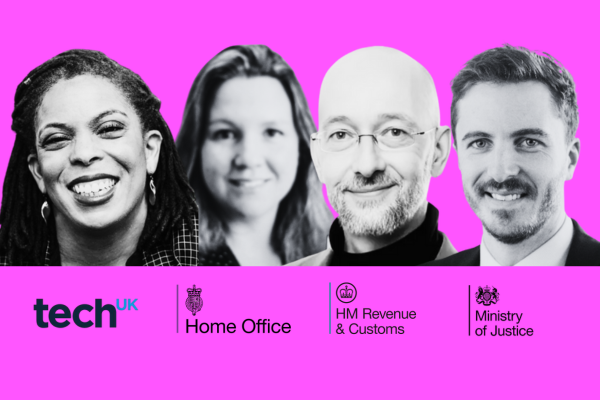What are the biggest barriers to delivering digital transformation for government leaders?
Government is under increasing pressure to improve digital services and transform operations in response to the changing needs of citizens and businesses. James Buckley, Head of Practice for Digital Transformation at Made Tech, hosted a roundtable on delivering transformation at the Government Transformation Summit in May, where he had a chance to speak to senior civil servants about the challenges they are encountering in getting this done.
There were a wide range of innovative case studies discussed throughout the course of the day; with two standout initiatives hailed by attendees as shining examples of government transformation. The first was Government Digital Services's One Login, a project that gives users a single online account for accessing public services. The second was DVLA’s new online portal, which allows customers to manage all aspects of their vehicle through one digital platform.
one digital platform.
Both projects serve as reminders that the best digital service you can design is a service where people can help themselves. The prevalence of interoperability in both these case studies also speaks to an exciting spirit of collaboration and data-sharing ahead.
Reflecting on the conversations and case studies he explored during the roundtable, Buckley said he was surprised at the level of consistency in the themes that kept coming up. While it was clear that each department has their own specific problems, there were a number of common barriers when it comes to delivering transformation today. These were the biggest culprits:
A lack of accountability
One of the most frequent issues raised by civil servants was a lack of structured accountability at the top of these complex delivery programmes, preventing the ability to have that end-to-end strategic view on projects and limiting opportunities for efficiencies and change.
This links to another recurring theme around leadership - or lack thereof - that appeared in conversations throughout the course of the day. Notably, a number of civil servants highlighted the fact that Chief Digital Information Officers are still waiting for a seat at the top table. “This continues to be a key pain point for transformation teams across government. It’s understood that having a digital representative to engage in top-level discussions would significantly help to raise the profile of digital as an enabler,” Buckley said.
Embedding digital skills that endure
Unsurprisingly, one of the biggest challenges continues to be the shortage of digital capabilities and the limited experiences of civil servants in building and implementing digital services. The pressure to protect and grow a workforce that can deliver on digital transformation goals continues to weigh heavily on civil servants’ shoulders. “There is a massive skills gap, which is obviously a big distraction across the civil service. The main barrier being that we can't pay enough - we can recruit, but we can't retain,” Buckley said.
The need to embed enduring digital, data and technology (DDaT) skills into every service team was acknowledged by the majority of attendees. But with these skills frustratingly hard to come by, there was less clarity on how best to do this.
At one point, the question was raised as to what suppliers could be doing to help build those internal capabilities. Buckley recommended three ways suppliers can support skills transfer in a much more structured way:
- Pairing civil servants with technical suppliers
- Mentoring and coaching initiatives
- Rotating roles to give civil servants the opportunity to move around the delivery teams and understand from a wider perspective of what's involved in the delivery
Policy to delivery
Another big hindrance to effective transformation continues to be the air gap between policy formation and delivery. Attendees spoke at length about the need for a more collaborative and integrated relationship between policy teams and civil servants in order to break away from ivory-tower policy making, which can so often result in failures to deliver.
Buckley said one tried-and-tested solution is to bring on a service owner-type role to act as a bridge between policy formation and theory of change development that policy teams do. “Having that go-between keeps the policy team grounded in the reality and practicality of what's actually achievable, enabling actionable digital solutions, rather than just airy fairy stuff that nobody will ever be able to do anything with,” he said.
This is how Made Tech supported the Department for Levelling Up, Housing and Communities (DLUHC) policy teams, supporting and effectively 'translating' policy into digital enablement but also challenging it, where required.
This touches on another theme that emerged, which is around the need for a more joined up, end-to-end system approach across government. One example raised was around unique identifiers: “You've got different organisations who traditionally record what's going on in different ways, eg. with different interpretations of Unique reference Numbers (URNs) - so you end up trying to compare apples and pears,” Buckley said. “This was identified as a major barrier to delivery.”
Data is king
One standout theme across the Summit was the growing role that a modern data strategy can play in delivering transformation. The challenge here is that while the amount of data and information available has increased, there is still a lack of insight across government departments
These concerns were echoed throughout the Summit, most notably in a keynote speech by Rich Corbridge, Director General Digital at the Department for Work and Pensions (DWP), who said: “Big organisations, whether in the public or the private sector, still struggle to understand how best to use data. We have so much information but not enough insight; so much capability but we don’t move fast enough.”
“To seize the opportunities data provides, DDaT teams must find more effective ways to derive value from the vast pools of untapped data currently available; this will be the key to greater transformation at scale,” Buckley said.

By Sam Birchall
Sam is the senior reporter at Government Transformation Magazine.Also Read
- NAO chief urges Whitehall to pair AI with cost transparency to unlock government productivity
- Beyond the consultancy cycle: rethinking how the public sector builds capability
- Transforming public services: why people, partnerships, and tackling technical debt matter most
- ‘Roadmap for Modern Digital Government’ sets out tech-led transformation to 2030





